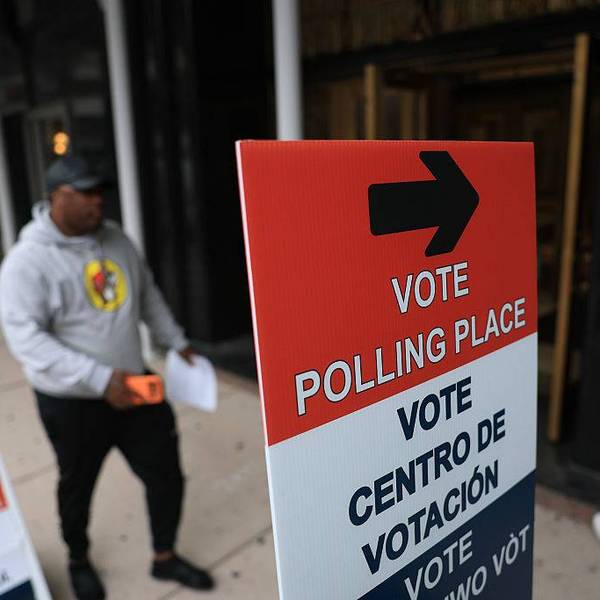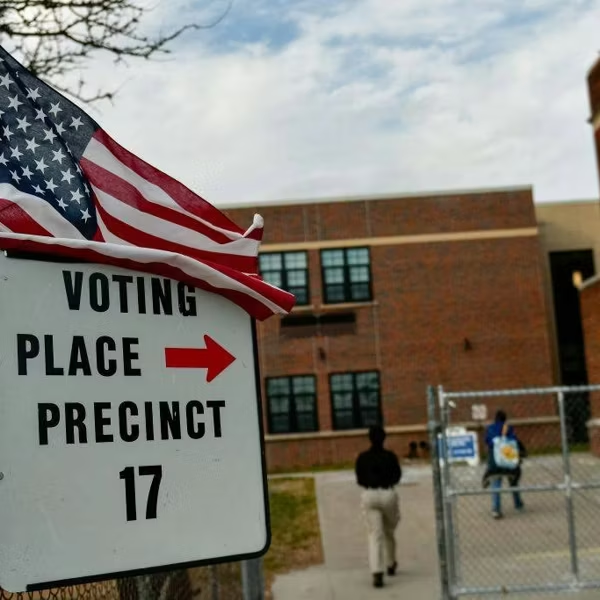Since U.S. Vice President Kamala Harris took the reins from President Joe Biden, the presidential race has tightened in key battle states as the momentum has shifted in Democrats’ favor. Why do so many people say that the 2024 presidential race is pivotal for the future of democracy? And what would a Kamala Harris foreign policy look like with regard to the transatlantic relationship, Ukraine’s war effort, China, and Gaza?
Political scientist and political economist C. J Polychroniou tackles these questions in an interview with the French-Greek independent journalist Alexandra Boutri. Unlike many radicals who won’t support the Democratic ticket if Harris does not change her policy on Israel, Polychroniou thinks that the 2024 presidential election has great implications beyond Gaza.
Alexandra Boutri: For the next couple of months or so, U.S. elections will be under the spotlight. It has been argued that because of Trump’s embrace of authoritarianism, the 2024 presidential election is pivotal for the future of U.S. democracy, critically consequential to Washington’s European allies, and potentially transformative for today’s geopolitical realities. Donald Trump and Kamala Harris also differ radically when it comes to climate change, immigration, and the economy. They are also quite apart across a broad range of issues related to gender identity and sexual orientation. Do you agree then with the view of many people who say 2024 is the most important election of their lives?
There is now such a huge gap between Democrats and Republicans over political and social values that each side fears that the other side will destroy the nation if they are allowed to dictate policy.
C. J. Polychroniou: The 2024 U.S. presidential election is enormously important for many of the reasons you cited, although we shouldn’t be oblivious of the fact that parochialism is what drives most American voters. That said, this election is indeed unlike any other in modern history also because American voters are so polarized that the threat of civil breakdown is real. In fact, I believe that Trump is already laying the groundwork for rejecting the election result if he loses. This is why he calls Democrats’ replacement of Biden a “coup” and even “a violent overthrow” of a president. And back in March, he said that there will be a “bloodbath” if he loses the November election. Obviously, there is something very wrong with the contemporary political culture in the U.S. I mean, compare what is happening in the U.S. to Britain’s political culture where civility is still the name of the game. Former Prime Minister Rishi Sunak not only conceded defeat and congratulated Labour’s leader, Keir Starmer, for his party’s victory, but took responsibility for the Tory party’s worst defeat in history.
Alexandra Boutri: Why does polarization run so deep in today’s United States?
C. J. Polychroniou: Political polarization among Americans has deep societal roots, with religion and race playing pivotal roles, but has been steadily intensifying in the last 40 or 50 years. There is now such a huge gap between Democrats and Republicans over political and social values that each side fears that the other side will destroy the nation if they are allowed to dictate policy. Democrats tend to be quite liberal when it comes to social issues, but most Republicans identify themselves as social conservatives. However, it is interesting to note that an annual poll on values and beliefs conducted last year by Gallup found that more Americans identify themselves as socially conservative than at any time in about a decade, although the largest increase was among Republicans. The role of guns in society, abortion, race, immigration, gender identity, and sexual orientation are among the issues that sharply divide supporters of the two parties, according to the latest findings from a Pew Research Center survey. Republicans and Democrats are also very much divided over the role of government power and global warming. In sum, it would not be an exaggeration to say that Democrats and Republicans live in different worlds.
Alexandra Boutri: How would you describe today’s GOP?
C. J. Polychroniou: Today’s GOP is the creation of one man alone—namely Donald J. Trump. What I mean by that is Trump can shift the party in any direction he chooses because he exerts a cult of personality over his followers. He can deliver fiery anti-abortion messages at some juncture during his political life, like he did when he first ran for president because he needed the support of evangelical Christians, but then decline to endorse a national abortion ban at another juncture because he fears that it would cost him votes if he did so.
Trump is not about ideology, values, or beliefs. Trump is the penultimate political opportunist who will say and do anything that might help him to achieve his goals. He is a clown, but a dangerous one who poses a real threat to democracy and the rule of law. The Republican Party has always been a reactionary political party but has now become an extreme political organization that fires up its base with lies and conspiracies. Trump employs the rhetoric of conservative populism, mocks the elite class, and pretends to be pro-worker. Never mind that Trump has no ideological convictions of his own and spent four years in office weakening unions and catering to the interests of the superrich. Most GOP voters have become blind followers of Trump and have neither the critical thinking skills nor the will to face the truth. They live in the political bubble that Trump has created for them. They would gladly take part in any political scheme conceived by Trump and even allow him to govern by dictatorial means. Moreover, virtually no Republican dares to stand up to Trump. He mocked and humiliated all his Republican rivals, but in the end they all fell in line and kissed his ring. I have a hard time coming up with politicians anywhere else on the planet who are so cowardly and obsequious as the Republicans are in the “land of the free.”
Alexandra Boutri: By the same token, the Democratic Party also went from being the “party of the people” to the party of the financial elite. Would you say then that it is the Democrats who paved the path for the rise of someone like Donald Trump?
C. J. Polychroniou: The Democratic Party has always been a pro-business party. Until recently, the differences between Democrats and Republicans were not that great. Indeed, as Noam Chomsky used to say, “The United States has essentially a one-party system and the ruling party is the business party.” So, it was largely a myth to say that the Democratic Party was the “party of the people.” Nonetheless, Bill Clinton remade the Democratic Party (after Jimmy Carter had already laid the groundwork for the shift to neoliberalism) to such an extent that it abandoned all pretext of being a party representing the working class. Clinton had revealed his anti-union credentials long before he made it to the White House. He had been working ceaselessly toward undermining the labor movement in Arkansas since the mid-1970s.
The U.S. is a global superpower, an imperial state, so it would be naïve to think that foreign policy can change dramatically from one administration to the next.
The working class ditched Hillary Clinton in 2016. Working-class voters, feeling betrayed by the Democratic Party and its economic policies, were a key demographic element behind Trump’s rise. Of course, it wasn’t just economics that drove white working-class voters to Trump’s camp. An equally important factor was racial and cultural resentment. Anyone who thinks that racism and xenophobia were not important factors in Trump’s rise or that they don’t figure prominently in the support he has been receiving since from the millions of his followers needs a reality check.
But something rather exciting has been happening over the past few years inside the Democratic Party. The progressive wing has moved the party to its left on key economic issues. Subsequently, Joe Biden has been very outspoken about supporting organized labor and his administration may be the most progressive in U.S. history.
If Trump returns to the White House, we should all brace ourselves for major shocks. We should expect to see mass deportations, systematic efforts to undermine democracy and rights in the U.S. and even abroad, the sacking of thousands of civil servants, the dismantling of the Department of Education, the expansion of presidential power (and bear in mind that an ultra-conservative Supreme Court gave presidents total immunity from prosecution for all official acts), major tax cuts for the rich, the end of policies to tackle the climate crisis, and even a rollback of policies that have aided minorities economically and socially. This is what’s behind Project 2025, a blueprint of over 900 pages for a second Trump term developed by the arch-conservative Heritage Foundation.
That said, I do not wish to create the impression that the Democratic Party has somehow become a democratic party of the alternative and progressive left. The irony is that the Democratic Party not only remains pro-capitalist, and with deep ties to Wall Street, but is even far more militaristic and pro-war than the Republican Party. And its leadership remains profoundly hypocritical. At the Democratic National Convention (DNC), one speaker after another, including Kamala Harris, spoke about justice and equality for all. But Democrats refused to give airtime to Palestinians who wanted to highlight the ongoing tragedy in Gaza. They also spoke about “joy,” “compassion,” and “safety” and then paraded a host of speakers who spread the message of militarism. As the brilliant Jon Stewart aptly summarized this amazing contradiction in his Daily Show following the conclusion of the DNC, “These are the new Democrats, man. They lead with joy and compassion and acceptance. And, oh yeah, we will fuck you up.”
Alexandra Boutri: What would a Kamala Harris foreign policy look like with regard to the transatlantic relationship and Ukraine’s war effort?
C. J. Polychroniou: I don’t think U.S. foreign policy under a Kamala Harris presidency will by any different from the Biden administration when it comes to engagement with European allies and support for Ukraine. In fact, she made that abundantly clear during her acceptance speech at the DNC. After all, continuity is one of the main characteristics in U.S. foreign policy. Transatlantic relations experienced an initial shock when Trump entered the White House in early 2017 but returned to stability shortly thereafter. And Biden’s foreign policy hasn’t been very different from that of Donald Trump. The U.S. is a global superpower, an imperial state, so it would be naïve to think that foreign policy can change dramatically from one administration to the next. Barack Obama campaigned for president in 2008 with the intent of bringing about a fundamental shift in the direction of U.S. foreign policy. He offered the promise of renewed idealism and a return to the rule of law. He fell way short of achieving even the slightest transformation. His U.S. drone program was far deadlier than what had taken place under the Bush administration. Obama carried out more strikes in his first year as part of a covert drone war strategy than Bush carried out in his entire presidency.
Alexandra Boutri: What about China?
C. J. Polychroniou: There is a looming superpower clash between the United States and China that I would place at the top of geopolitical risks for the years ahead. An incident in the Taiwan Strait or the South China Sea could easily trigger conflict escalation. The U.S. is obsessed with how to respond to China’s involvement in the South China Sea. And this is not merely a question of prestige and power. The U.S. Energy Information Administration estimates that the South China Sea holds about 11 billion of barrels of untapped oil and 190 trillion cubic feet of natural gas. We remain a highly violent species. Trump won’t solve the U.S.-China conflict, and I doubt that Kamala Harris will become the next Richard Nixon on U.S.-China relations.
Alexandra Boutri: I suppose then that you also don’t expect a shift in U.S.-Israeli relations under a Kamala Harris presidency. Will she at least handle Gaza differently?
C. J. Polycroniou: I think the answer is negative on both counts. Israel is the most important strategic ally that the U.S. has in the Middle East. What this means is that the U.S. will continue to look the other way to whatever Israel pleases to do and will confine itself to the use of diplomatic language in connection to any Israeli violations of international law and human rights simply for PR purposes. But Israel’s total dependence on the U.S. is something that should worry future generations in Israel. What will happen if Israel happens to lose its strategic value in a future world order?
Alexandra Boutri: The Hamas October 7 attack continues to divide the world and in particular the left. Didn’t the Hamas leadership anticipate a massive Israeli response? Or it is that they didn’t care?
C. J. Polychroniou: What’s been happening in Gaza for more than 10 months now is one of the greatest crimes in the postwar era, a totally disproportionate response to the October 7 terror attack inside Israeli territory. But, at the same time, it is inconceivable that you have people, leftists and radicals, who refuse to condemn Hamas for those horrific actions against innocent Israelis, many of whom were in fact peace activists. Also, and putting aside the question of who a terrorist is actually, I find rather absurd the comparisons between the Hamas organization and the anti-fascist resistance movements against Nazism. Israeli Prime Minister Benjamin Netanyahu’s far-right government is beyond extreme. But Hamas is not some sort of a progressive “liberation movement.”
The October 7 attack is a war crime. Plain and simple. I am baffled by those (and, as you know, I’ve had some unpleasant exchanges over this matter with certain people) who try to argue that the October 7 attack is justified on moral grounds and strategic considerations. Attacking civilians is never moral. Both Hamas and Israel are guilty of the same crime. Hamas and Israeli leaders are indeed war criminals. And what exactly are those strategic objectives on the part of Hamas that can justify the October 7 terror attack against innocent Israeli civilians? Israel has destroyed almost all of Gaza’s infrastructure; killed more than 40,000 Gazans, mostly women and children; and Hamas has been severely weakened. Perhaps Hamas did not anticipate such a brutal response on the part of the Israeli military. Perhaps its leadership did not think that their operation would be as vast as it turned out to be given the state of Israeli military intelligence. But I am sure that they also did not care if innocent civilians in Gaza were going to be killed because of their actions. They would probably call that “collateral damage,” just like the Israelis do. And this war has also made the two-state solution a virtual impossibility, although there was never any real chance of that happening anyway. In fact, I am of the opinion (and hope that I am wrong) that the goal of Palestinian self-determination has been made far more difficult now on account of the October 7 attack despite of the fact that support for the Palestinian cause continues to grow among civil society organization across the globe.
Alexandra Boutri: One final question, and it has to do with third-party and independent candidates running for president. Could they affect the 2024 vote?
C. J. Polychroniou: One could and should be in support of third-party candidates for all sorts of reasons. The problem however with the U.S. political system is that they have no chance of winning a presidential race. I doubt that they can even shake up the two-party system. You need some form of proportional representation, like the system that exists in many European democracies, for third parties in the U.S. to make a real impact on national politics. But third-party candidates can easily end up having the opposite-than-desired effect, which is to help the candidate they least want in the White House emerge victorious. And this may very well happen if voters in swing states who are opposed to the Democrats on account of the war in Gaza end up casting their ballots for third-party candidates.




